Difference Between MIS and ERP: Definition, Roles, and Advantages They Bring
Updated 25 May 2023
12 Min
9951 Views
Recent Panorama research shows that 81% of organizations are either implementing ERP systems or have already completed the process. MIS software doesn’t lag far behind. It’s widely used in sales, marketing, HR management, accounting and finances, and many other areas.
Both MIS and ERP systems help companies with data management and decision making. Still, there’s a little bit of difference between them. In this article, we’re explaining what is ERP, what is MIS, and what is ERP in MIS. Stay tuned if you’d like to know more about these systems, their differences and similarities plus pros vs cons of implementing.
What is MIS and How It Works?
Before drawing peer to peer comparison of MIS and ERP systems, let’s define what they are used for. We’re going to start with MIS.
MIS stands for a management information system. It’s a centralized database that stores data about a company or enterprise. The main role of MIS software is to process data collected from various departments and draw a report based on it. These systems also provide information support for management decisions.
MIS works with people, technology, and information that influence the business. A properly implemented management information system can double the efficiency of management operations within the organization. Successful middle-sized companies and large enterprises develop these systems to increase income and enhance its profitability.
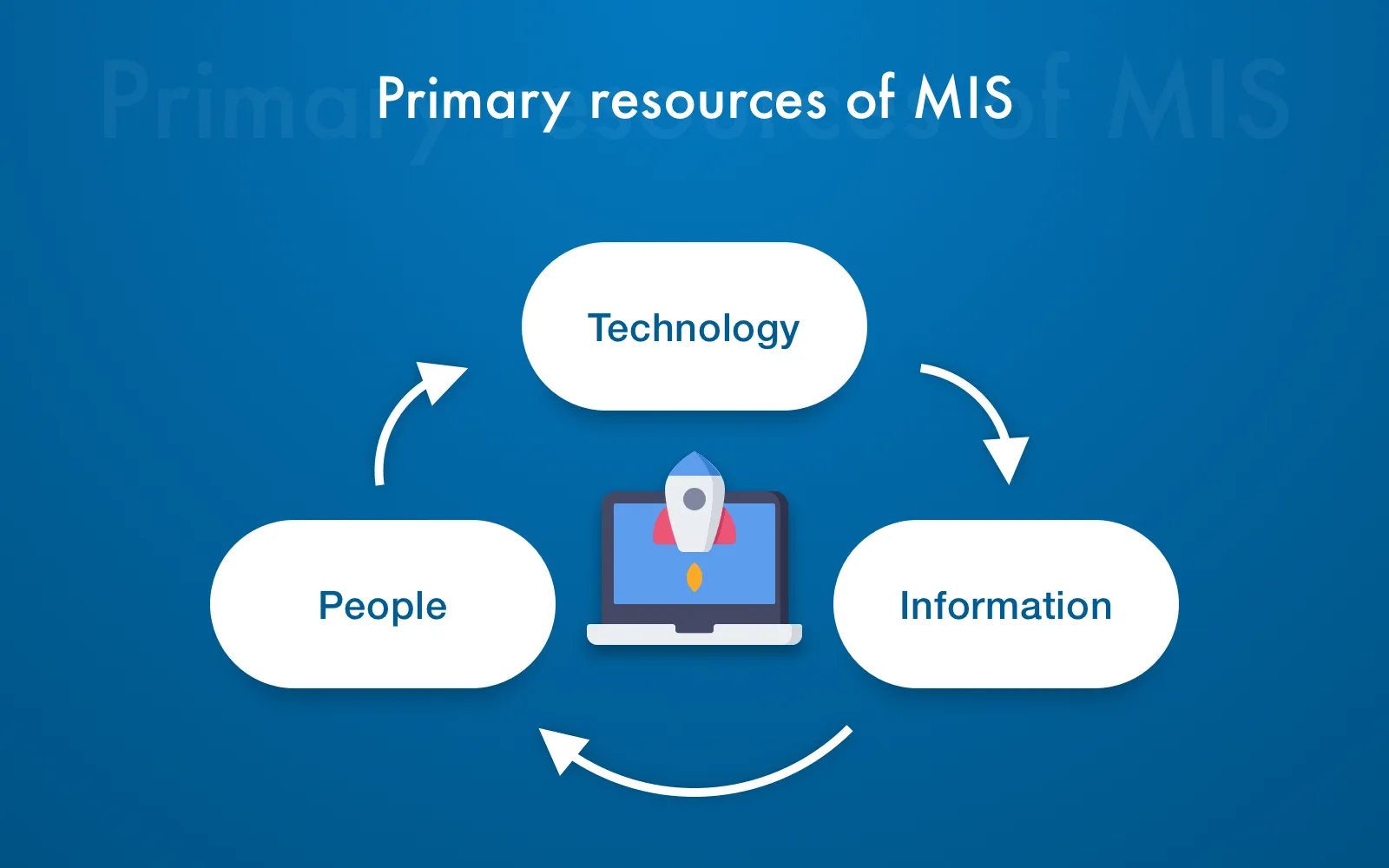
Main concept of MIS software
MIS software is initially focused on a specific business. So it’s the main business process of a company that is being considered. For instance, the restaurant model: they need to plan the budget, organize the delivery of food items, prepare dishes and serve them to customers. Restaurants take advantage of MIS on each step of this process.
Let’s find out how exactly they do it:
1. Strategic control. Business owners use MIS for planning their budget, defining target markets, policies, and objectives. They compare weekly sales to ingredients cost which allows for tight cost control.
2. Managerial control. Managers create menus, collect customer feedback regarding food and service quality. Even when an order gets canceled, MIS stores its details including the reason for cancellation.
3. Operational control. This part stands for processing tasks with the help of appropriate technologies. For example, when a waiter takes an order and sends it to the kitchen using terminals located in the dining room. Another example is chefs sending 'out of stock' notices when the kitchen is out of food items.
By following this example, we can define three levels of MIS users:
- Top managers (strategic control)
- Middle-level managers (managerial control)
- Operations managers (operational control)
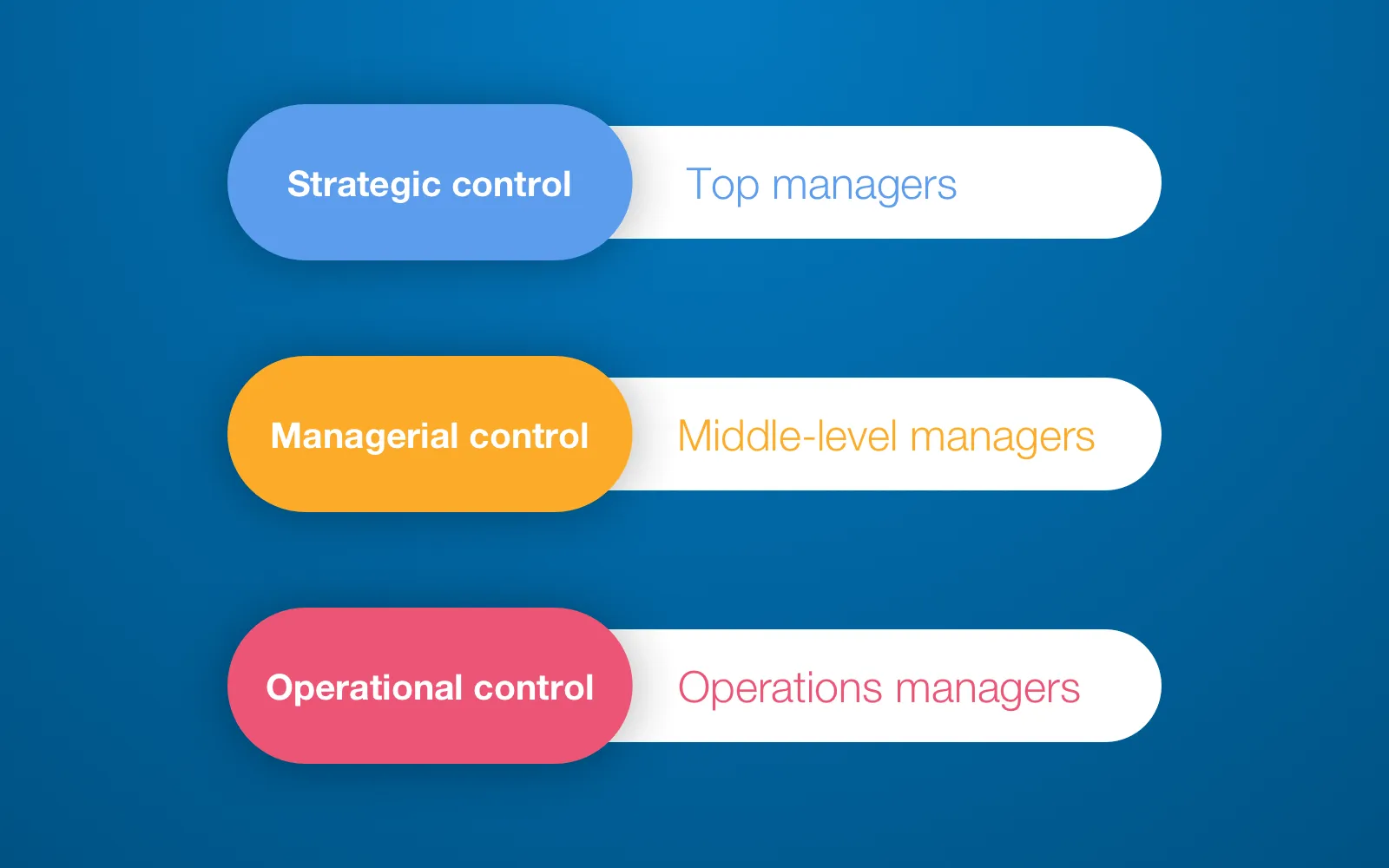
Concept of a management information system by user levels
But the food industry is not the only sphere that can benefit from MIS software. These systems are also used in Finances, Marketing, Manufacturing, IT and many others. Why? Let’s check the advantages of management information system in business to find out.
Advantages and Disadvantages of MIS
It’s always a good idea to start with the positive side, so we’re going to review the benefits of MIS system fist.
Single database
Managers and employees have access to a database with all the data needed to process everyday tasks. Business operations are getting smoother as information is always in hand. Also, staff can standardize data collection methods, for example, by using forms or questionnaires.
Ability to prioritize tasks
Due to an efficient system, employees focus on important tasks. There's no need to spend hours on saving or retrieving data manually. As a result, the company is saving on manpower costs and employees are working more productively.
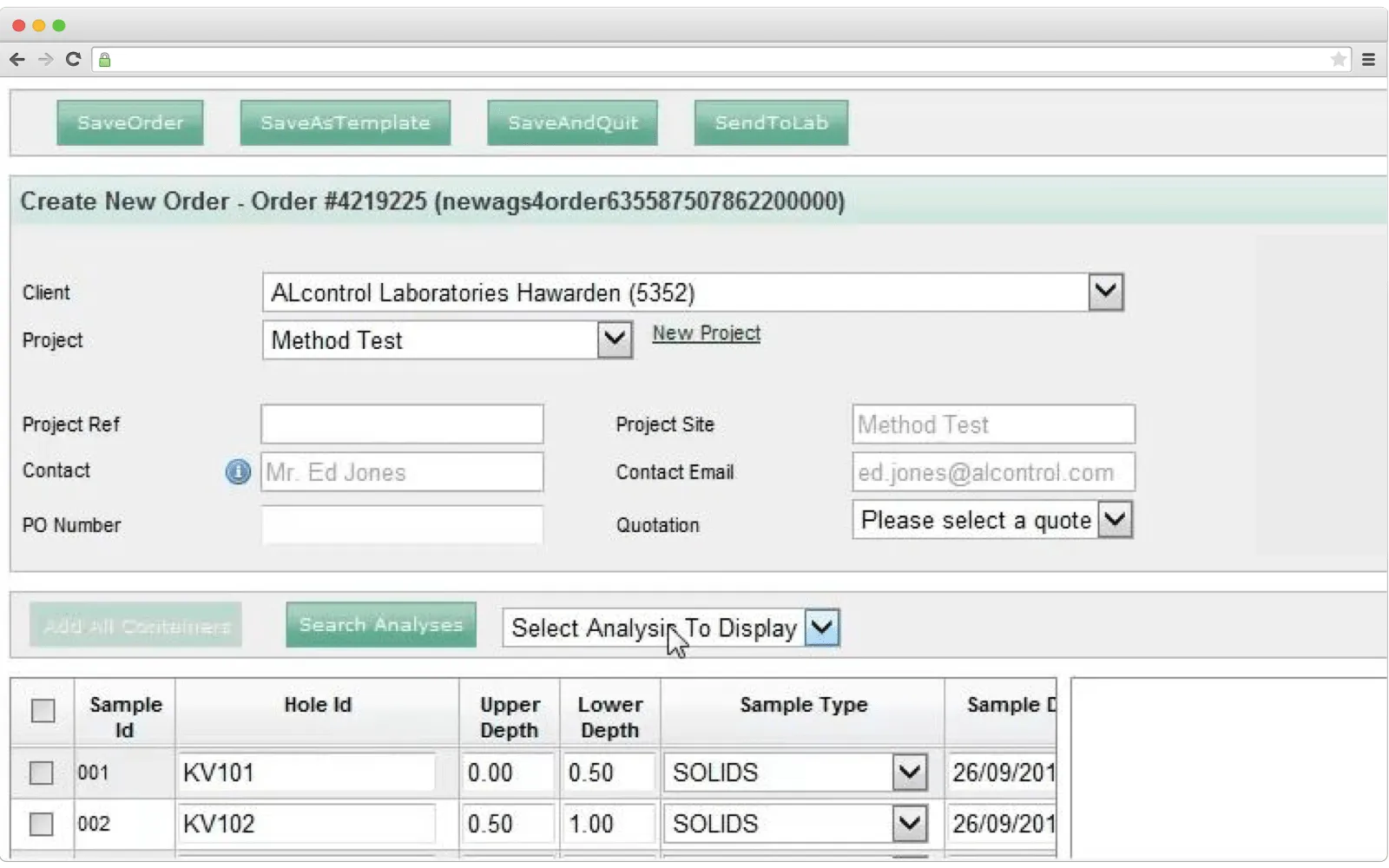
Order details can be entered and retrieved right away
Improved decision-making process
MIS usually have data processing tools that make conclusions based on input data from various sources. It helps with material management, manpower allocations, etc.
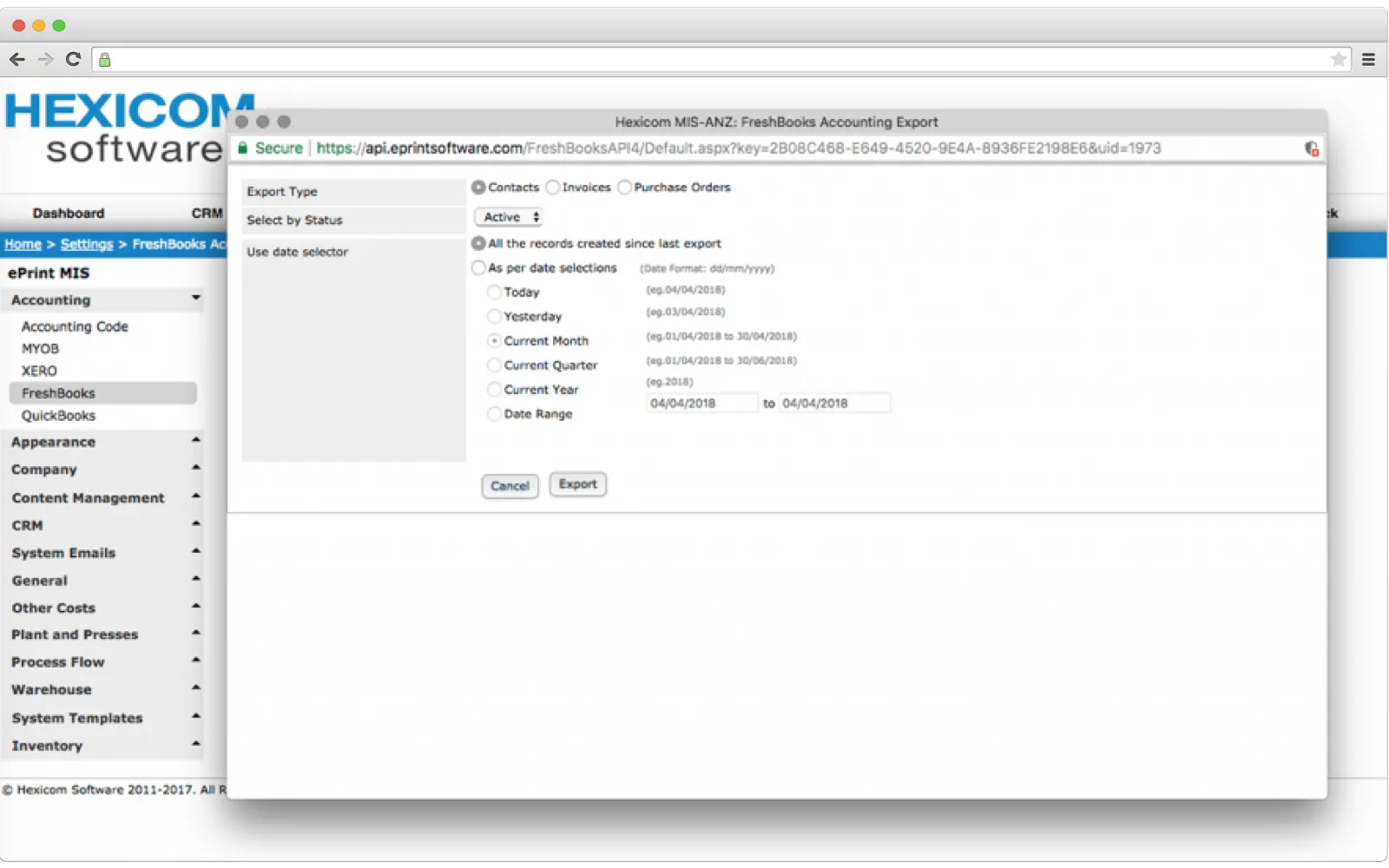
MIS allows users to export details from other sources
High degree of accountability
In MIS, all user actions can be tracked. Thus, finding who made a specific change is no longer impossible, not even time-consuming. So managers easily find out who made a critical mistake or who are the best performing employees.
No paperwork
Among the advantages of MIS is the reduction of paper stored in the office. Departments access the central database directly from the company network to check the required details. This not only makes the whole process much faster but helps to reduce expenses on papers, printers, ink, etc.
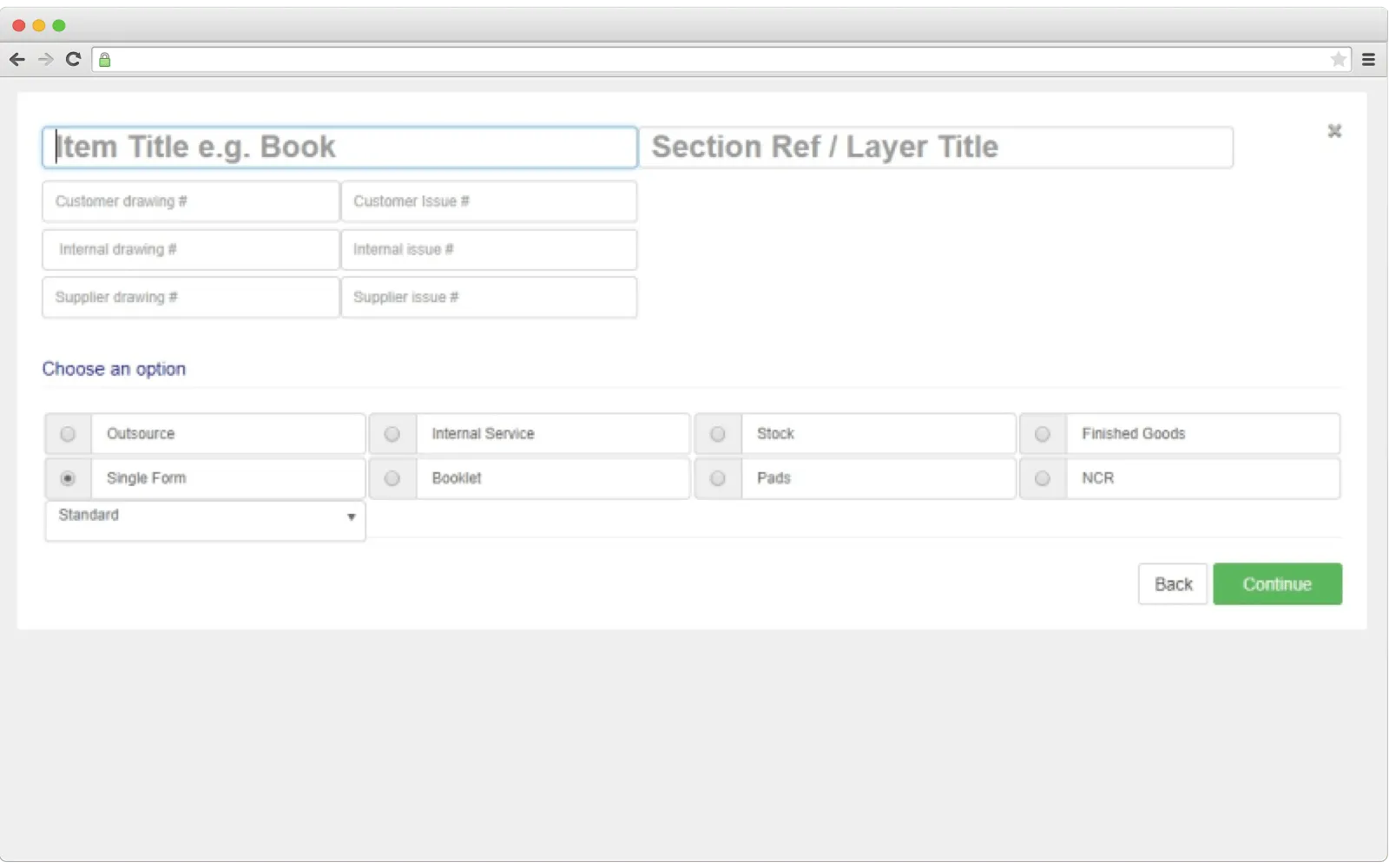
Among main functions of MIS is simple data access
Understanding the financial situation
MIS help top managers to evaluate the overall financial situation of the company. They can easily check status reports of different projects and find out how successful they turn out to be.
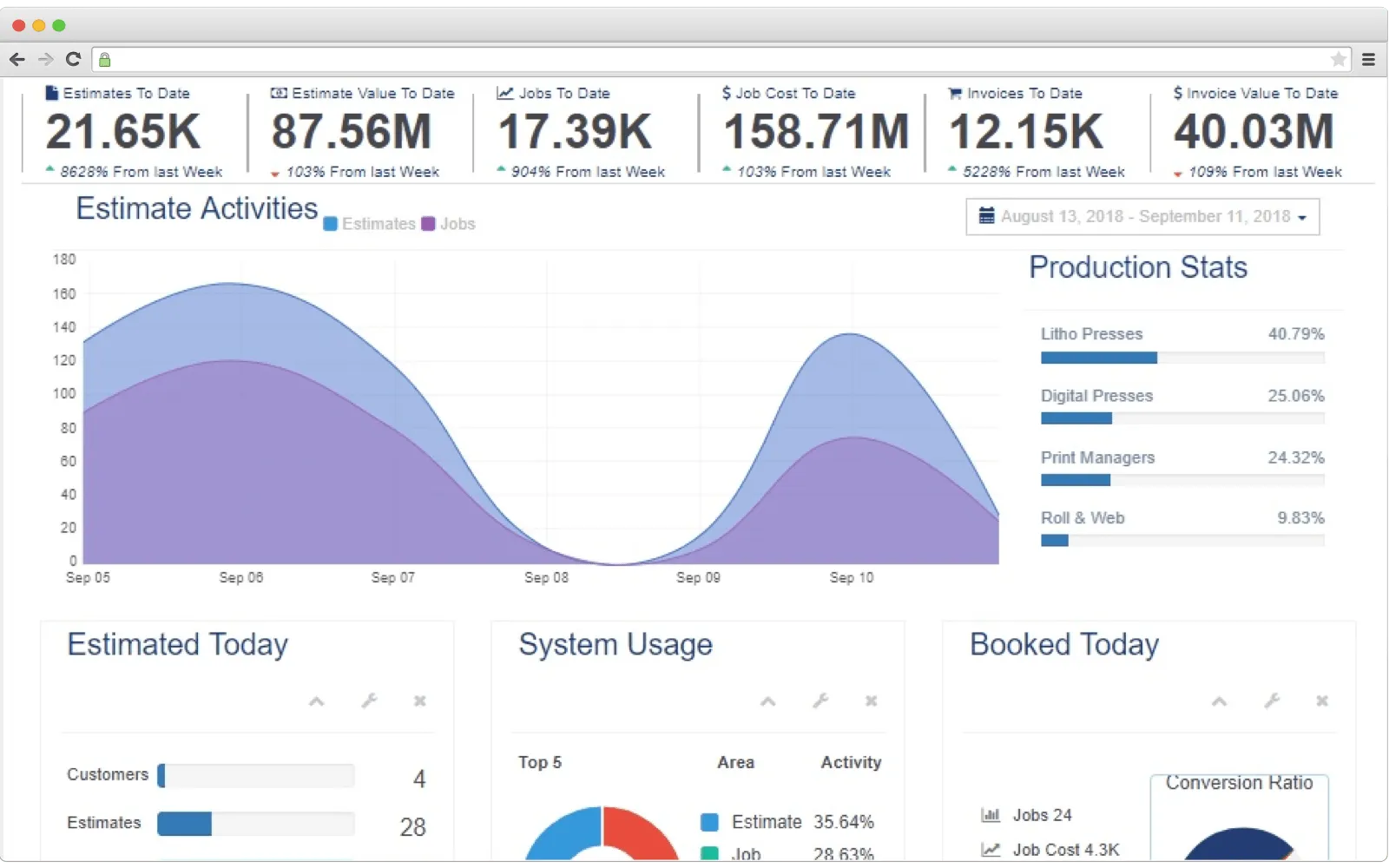
With MIS, managers are always aware of current financial situation
Staying competitive
MIS software stores and processes data in a faster and easier way. Customers are satisfied with the level of service as their requests are processed faster. And employees get rid of mundane tasks and are more motivated to work. So companies achieve better results on both fronts.
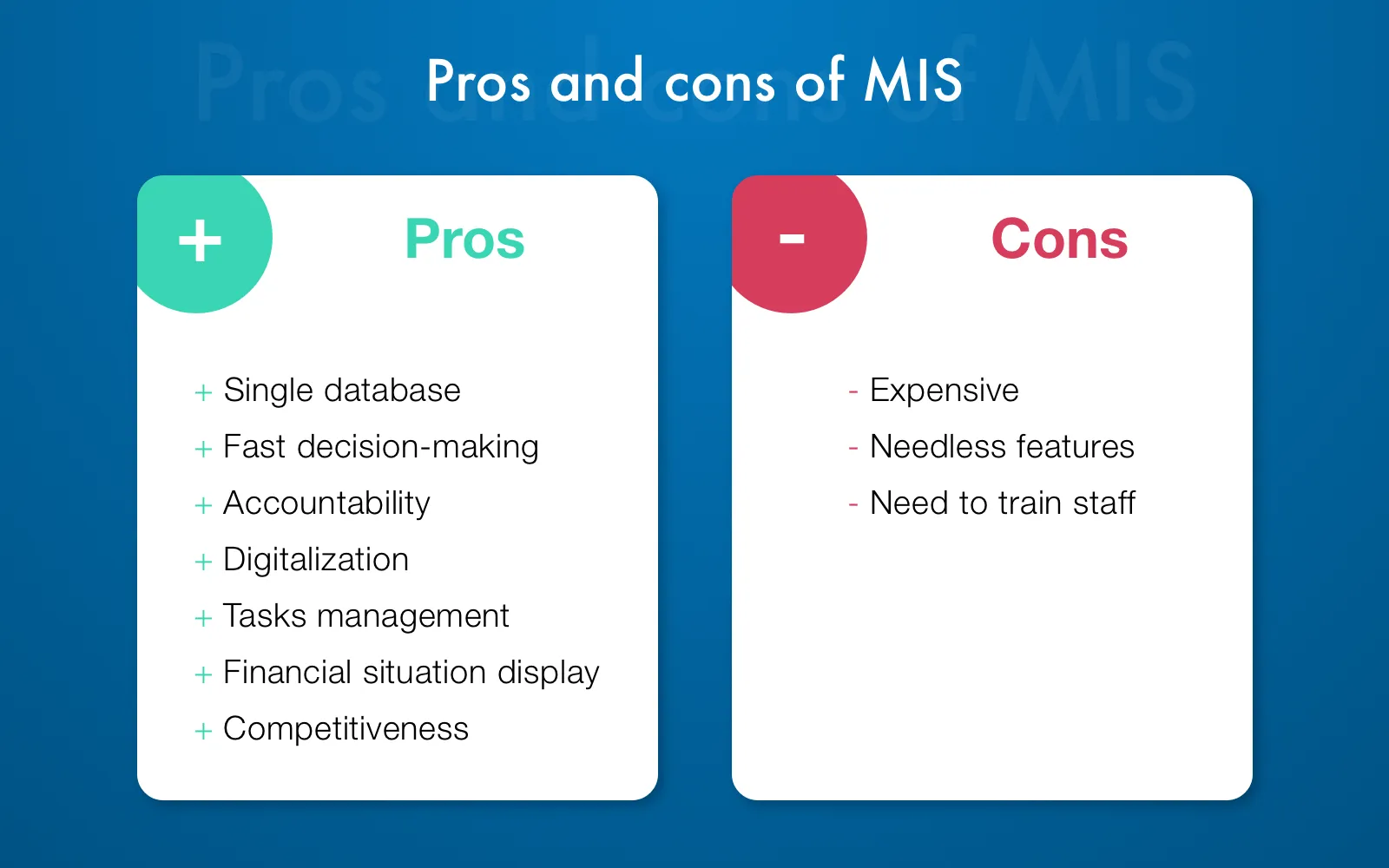
Benefits and drawbacks of management information system
Unfortunately, there’s always another side of the coin. MIS software also has its dark sides, so we’re going to uncover them.
Expensive to purchase
Both the development of a custom solution and purchase of a ready-made suite may cost a fortune. So MIS software is rather a choice of medium-sized and large enterprises that need to process a terrific amount of data.
Doesn’t have the required features
Ready-made suites may not have the features a business needs. Or vice versa – there may be tons of non-needed options. And there's no way to return the investments if the company has better access to data no one needs.
Need to train personnel
There's no use of MIS if the staff doesn't know how to work with it. So the company will have to spend some time and money on teaching employees how to work with the system. But these investments will pay off as soon as the system is fully implemented.
What is ERP?
ERP stands for enterprise resource planning. In short, this is a process of managing such components of business like human resources, planning, sales, marketing, and so on.
ERP software is developed to facilitate interaction between core business processes within a company. It's a large system that allows enterprises to manage information, facilitate its sharing, work on business planning, etc. These systems combine a variety of processes and increase their efficiency.
Want to find out more about ERP systems and their roles? Check our ‘ERP Software Basics’ article featuring these and many other details!
ERP software binds different systems of a large organization together. Without the system, each company's department would have its own software for processing specific tasks. With ERP, departments still have their own system optimized for tasks they process, but it can be accessed via a single application.
A great share of modern organizations implements customized ERP software for their business. These applications are modular and store data in a central database. And if you get to know how to develop ERP software from scratch, there’s no need to worry about synchronization between various systems.
Still, ERP software is not an answer to everything. It may not eliminate inefficiencies within the company. Instead, managers may need to change the way the company's organized to reach top results. Otherwise, all they get will be tons of money spent on an incompatible system.
Pros and Cons of ERP Systems
We've already checked the benefits of management information system and its drawbacks, so to be completely impartial, let's take a look at the pros and cons of ERP software.
Easy reporting
ERP works as a unified system for collecting reports. The software often has an in-built pattern for standard financial reports, or staff can generate custom ones at any time.
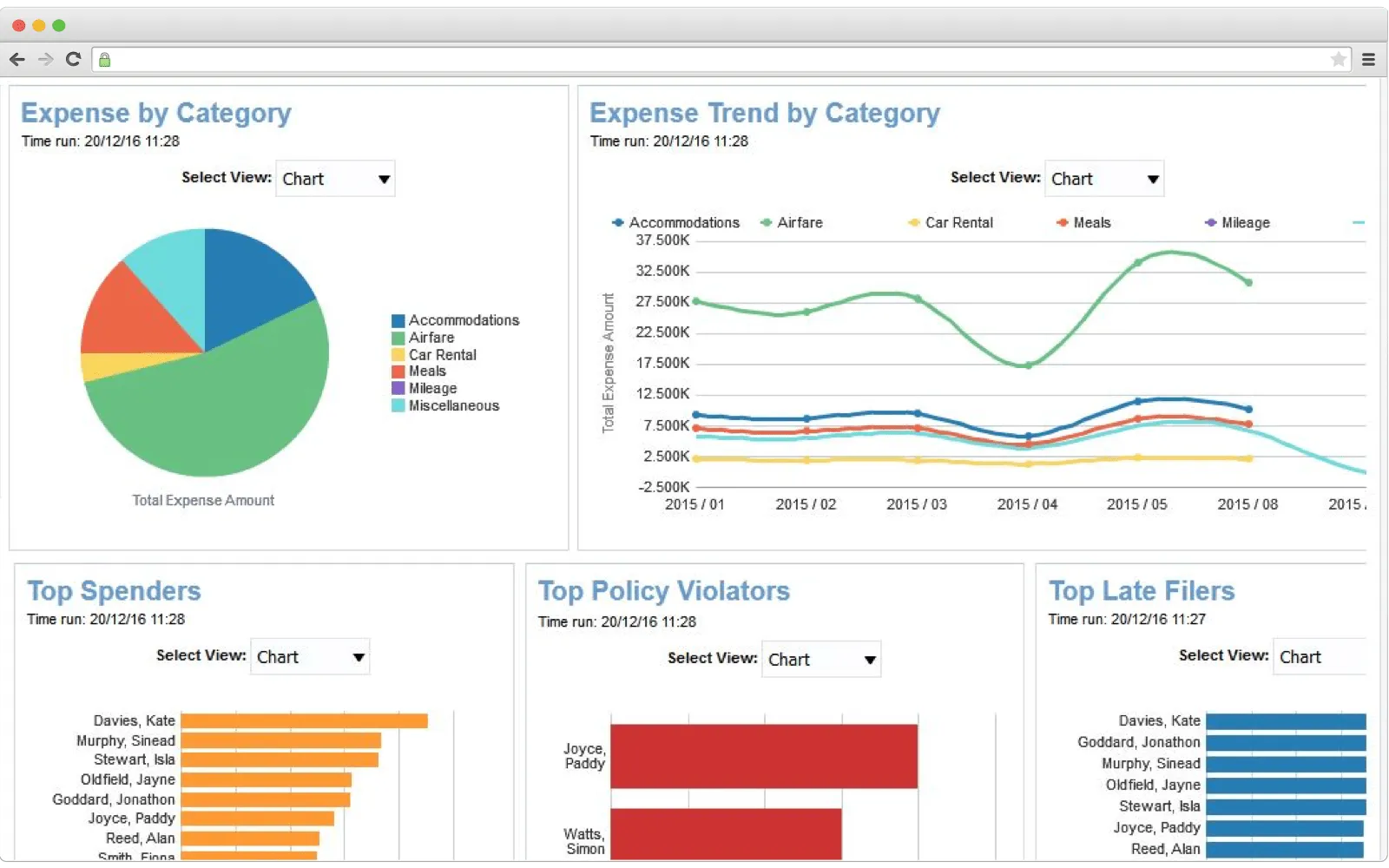
How reports look like in ERP
Increased efficiency
Same as MIS, ERP software helps reduce the load by processing some daily tasks automatically. A properly implemented software reduces the number of repetitive manual processes, and the team can focus on more important tasks.
Securing data
Another benefit ERP brings is securing data. These systems have in-built tools to ensure data protection. First, managers provide different access levels to employees. Second, the data is stored in one database and not various sources. So it's easier to establish its protection.
Finally, ERP solutions backup critical and sensitive data. So even if part of important information is accidentally removed, it won't take long to restore it.
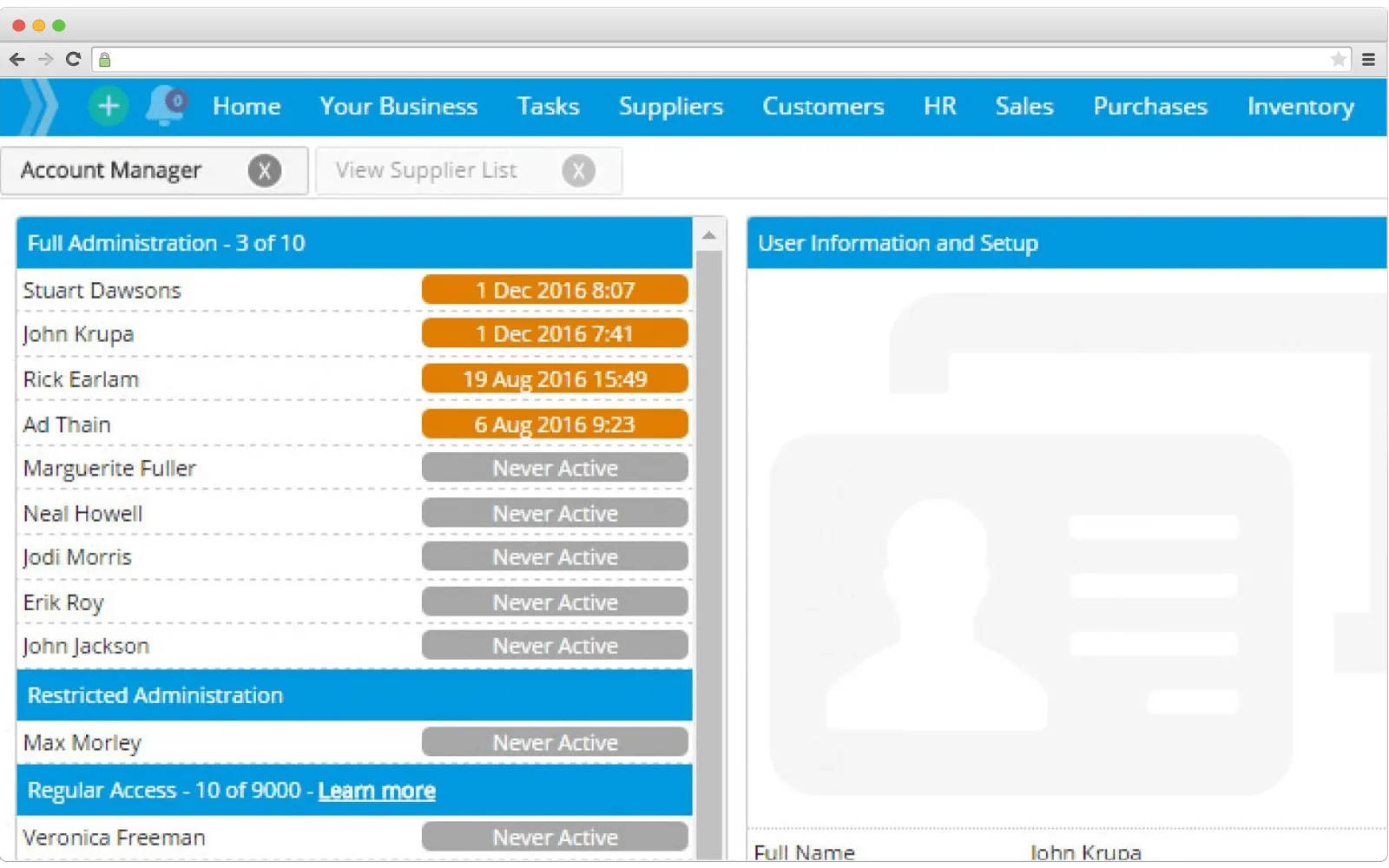
Administrators can easily manage user profiles in ERP
Improved workflows
ERP software provides access to data the staff requires just when they need it. These system work with a central database. Information from one department is transferred into the centralized location, and other departments can review it.
ERP solution doesn’t always mean a desktop solution. Find out how to develop its mobile version in our ‘Mobile ERP Strategy Development: Examples & Reasoning’ guide.
Improved supply chain management
Companies dealing with transportation of inventory or production can exhale. Improvements that ERP can offer include the minimization of order processing time, more on-time deliveries and other processes that ensure business success.
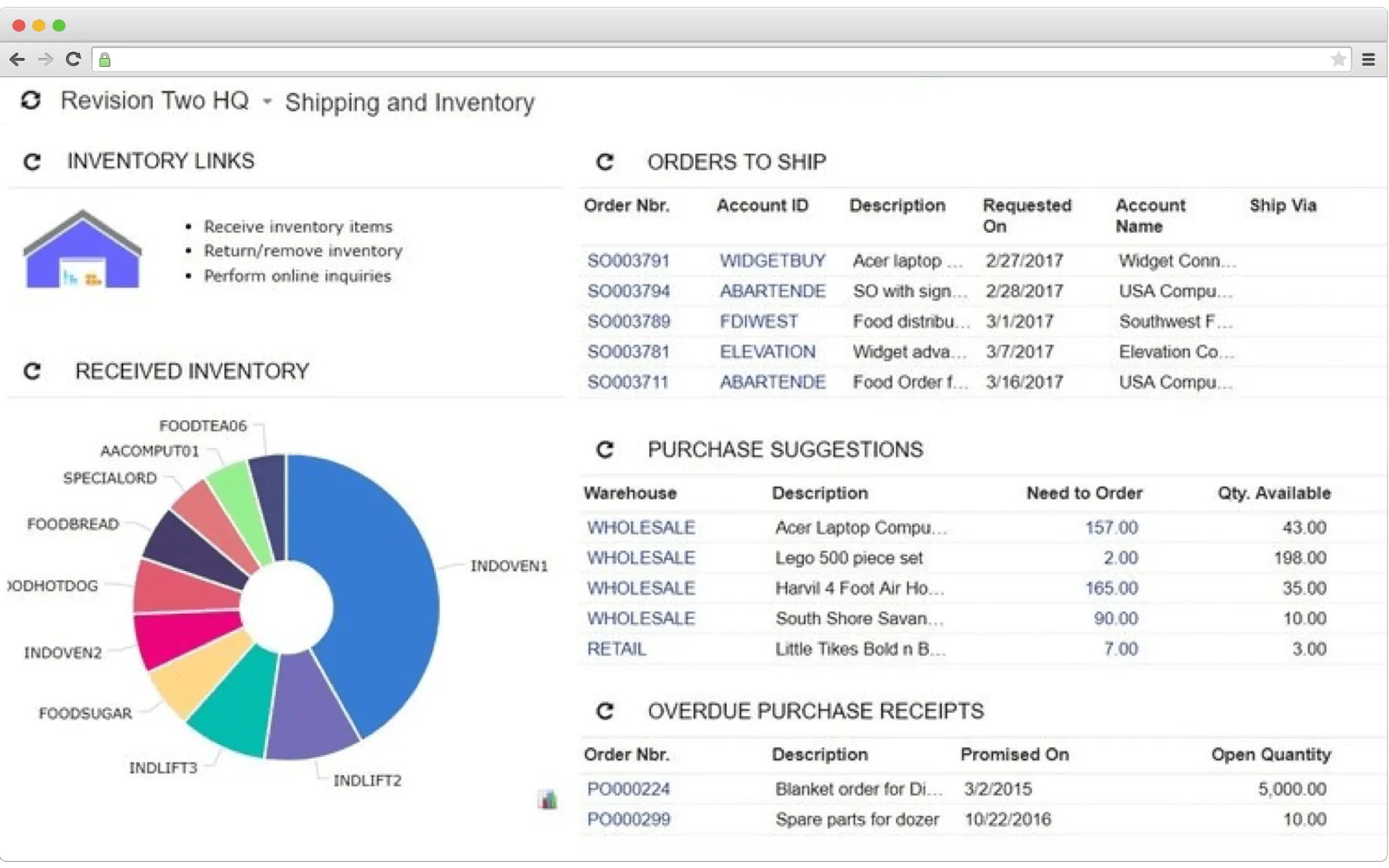
All shipping and inventory details on one page
Increased scalability
When the company expands its customer base, sets up new business processes, opens up new departments, they need a scalable system that also can be expanded.
With custom ERP software, it ends with finding a team that provides software development services and making sure they understand the future plans for growth.
Customer service
ERP brings advantages to both internal and external clients. As the software automatically processes customer data, sales managers can focus on working with people rather than entering their details into a database.
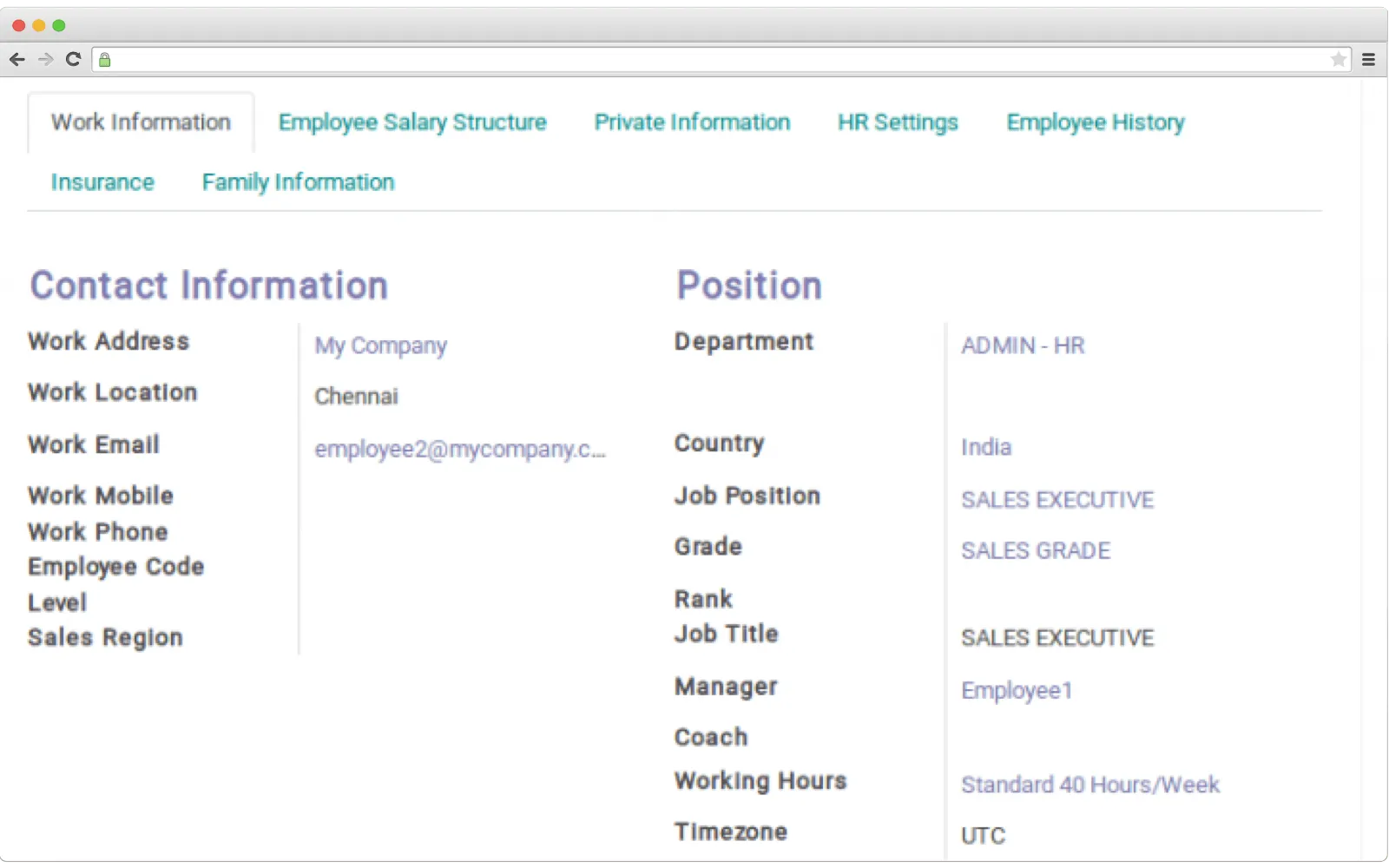
How employee profile may look like in MIS
Checking all the benefits of ERP software, you might already want to develop such a system for your company. Still, remember that drawbacks and risks are always there. And now's the time to meet them face to face.
Here’s 2 ‘c-’ issues you may face prior or after ERP system implementation:
Cost
For instance, if you prefer purchasing a traditional suite, you may end up spending tens of thousands on the license. It's possible to reduce the cost by going for a cloud-based system with monthly payments. But mind that personnel and clients will have access to the system only if the monthly subscription is extended.
Mind that UI/UX design plays a great role in software usability. So make sure you're ordering first class UI/UX services.
Customization
When companies understand that the system they've purchased doesn't meet their requirements, they often turn to customization. This process may indeed help with filling business needs, but it doesn't come for free. So they spend tons of time, money and efforts on customization as well as paying a sum for the license.
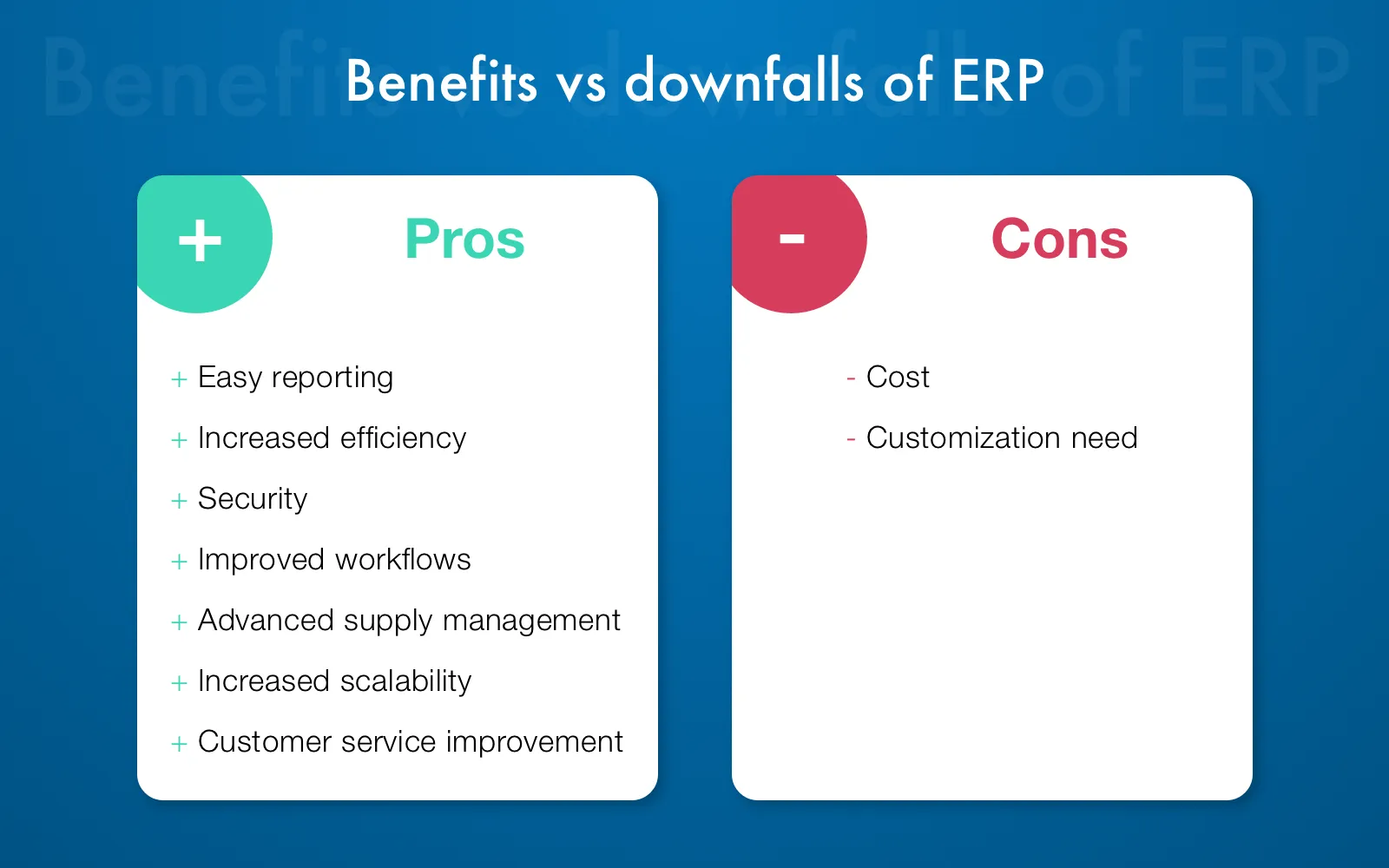
Advantages and disadvantages of ERP systems
Still, the aforementioned cons are not blockers.
First, if the system is chosen according to the actual needs of the company, it’ll pay off pretty quickly.
Second, there’s always an option to develop custom ERP software. This way, the system will have only required features and no unnecessary solutions.
Eager to build your own ERP solution? Drop us a line, and our experienced developers will gladly help!
Finally, it's possible to reduce the cost by asking developers of creating MVP only. And business owners can add some required features at any moment being 100% sure they are going to pay off.
How MIS and ERP are Related to Each Other
By defining the roles of both MIS and ERP system, we can easily understand their relationship. ERP is considered to be a part of a management information system. And here's the main difference between these two systems:
MIS is responsible for information management. It organizes and stores data collected from various sources in a single database and draws reports based on this data.
ERP is used for planning and automizing different processes. These systems analyze data and allow managers to forecast development decisions.
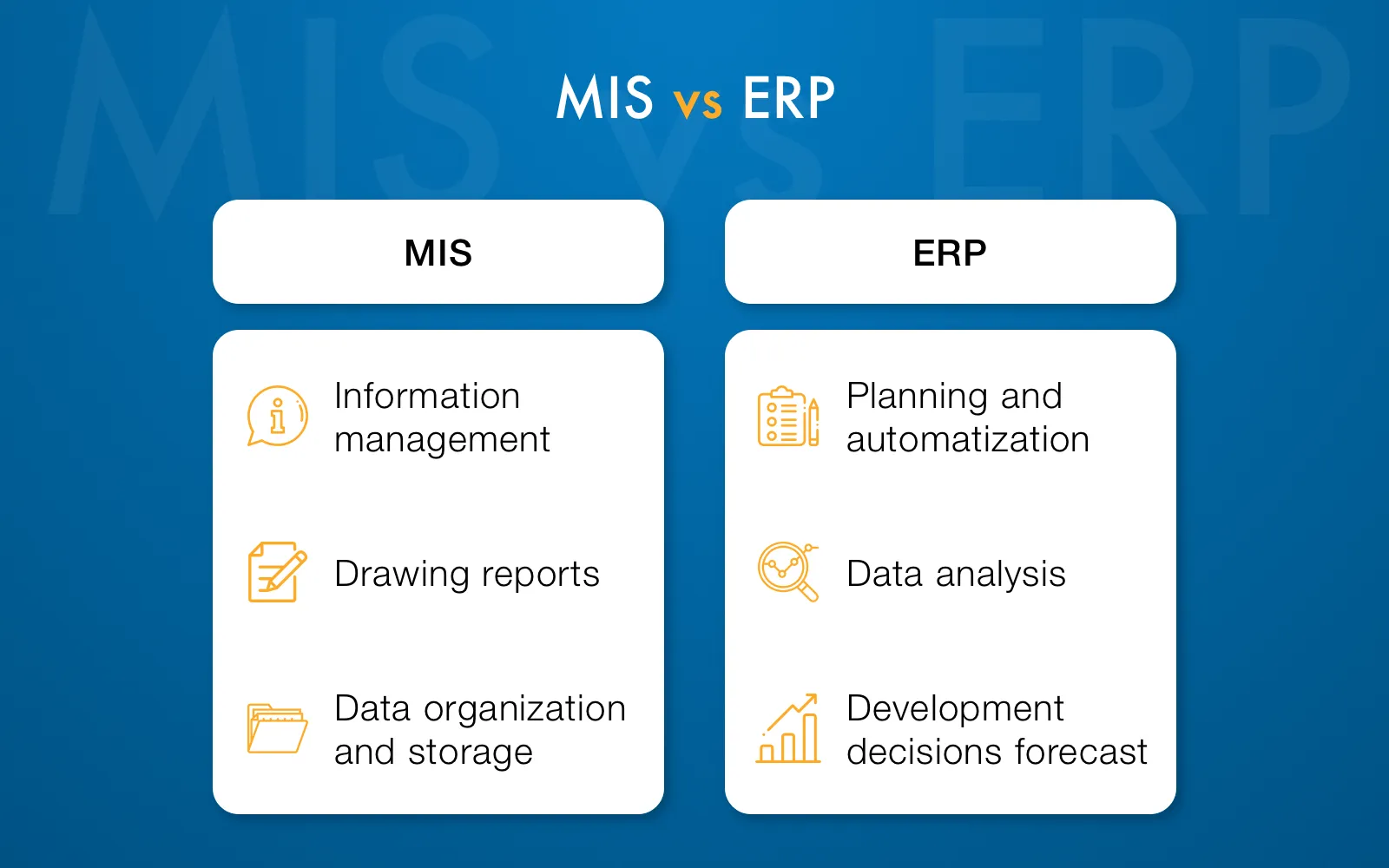
Comparing MIS vs ERP software
How Can We Help You?
At Cleveroad, we provide top-notch web development services. And our team has decent experience in bringing enterprise-level solutions to life. You can consult with our managers and software engineers prior to making any further steps. It’s completely FREE.
Looking for enterprise software?
We'll help you come up with the best solution tailored to your business needs.
ERP stands for enterprise resource planning. In short, this is a process of managing such components of business like human resources, planning, sales, marketing, and so on.
ERP software is developed to facilitate interaction between core business processes within a company. It's a large system that allows enterprises to manage information, facilitate its sharing, work on business planning, etc.
MIS stands for a management information system. It’s a centralized database that stores data about a company or enterprise. The main role of MIS software is to process data collected from various departments and draw a report based on it. These systems also provide information support for management decisions.
MIS benefits:
- Single database
- Ability to prioritize tasks
- Improved decision-making process
- High degree of accountability
- No paperwork
- Understanding the financial situation
- Staying competitive
ERP system advantages:
- Easy reporting
- Increased efficiency
- Securing data
- Improved workflows
- Improved supply chain management
- Increased scalability
- Customer service
ERP system pitfalls:
- Cost
- Customization
Here's the main difference between these two systems:
MIS is responsible for information management. It organizes and stores data collected from various sources in a single database and draws reports based on this data.
ERP is used for planning and automizing different processes. These systems analyze data and allow managers to forecast development decisions.
By defining the roles of both MIS and ERP system, we can easily understand their relationship. ERP is considered to be a part of a management information system. ERP analyzes data stored by MIS systems.

Evgeniy Altynpara is a CTO and member of the Forbes Councils’ community of tech professionals. He is an expert in software development and technological entrepreneurship and has 10+years of experience in digital transformation consulting in Healthcare, FinTech, Supply Chain and Logistics
Give us your impressions about this article
Give us your impressions about this article
Comments
2 commentsVery well described article...Difference of MIS and ERP could be more detailed, but still great
Very informative article, still have more question on MIS and ERP interactions.